Only 2 days to go now before my studio is open. See the directory details for times and directions at http://www.open-studios.org.uk/.
I will be demonstrating some of the mediums I use such as painting canvas's in acrylic, demonstrating how I prepare paper for life drawing and also painting watercolour sketches.
I have included some photos below of the stages of a painting I am currently working on. It was a warm day with people browsing the art stalls along the river in Rome. The dappled sunlight through the plane trees was wonderful. The painting is almost finished so come and see it in my studio.
Thursday, 30 April 2015
Tuesday, 28 April 2015
New Venice watercolours
Only 4 days to go to open studios and today I am looking through my sketches of Venice to mount a few of them. My favourite are those of gondolas on the Grand Canal. I can picture the gondolas bobbing up and down and the postures of the gondoliers as they delicately steer their boats. You need to have incredible strength .. I am sure it is not as easy as it looks. Below are a few of my recent favourites:-
These watercolours are done with Schmincke pan watercolours and a large squirrel brush for either washing or finer marks. I use a sepia crayon to capture a few key lines. I always need to remind myself to keep it simple. Sometimes less is more in these small sketches.
If you want to learn more about my watercolour painting, come along to my open studio in May or email liz@lizmilburn.co.uk to visit by appointment.
These watercolours are done with Schmincke pan watercolours and a large squirrel brush for either washing or finer marks. I use a sepia crayon to capture a few key lines. I always need to remind myself to keep it simple. Sometimes less is more in these small sketches.
If you want to learn more about my watercolour painting, come along to my open studio in May or email liz@lizmilburn.co.uk to visit by appointment.
Wednesday, 15 April 2015
New cards for Open Studios 2015
I have been packaging up my new cards which are prints of my latest Rome paintings. I'm pleased with the quality, they bring back happy memories of Rome. See photos below, they will be available to buy at my Open Studio in May.
Tuesday, 31 March 2015
Open studios in May
This year I am taking part in the West Berkshire and North Hampshire open studios in May. The brochures are now available (I have a few copies or you can get them from various venues in Newbury). All the details are also on the website www.open-studios.org.uk.
I also have my open studio invites which I will be distributing after Easter. I hope you like the image.
I also have my open studio invites which I will be distributing after Easter. I hope you like the image.
.jpg) |
| Open studios invite (front) |
Tuesday, 10 March 2015
Venice - Canal with the yellow poles
Venice is such an amazing place to visit. This painting brings back so many happy memories of my wanderings in Venice with camera and sketch book. Here are some of the notes I made and below the resulting painting -
- large yellow poles - tall and almost imposing - much bigger than I expected them to be
- narrow side canal - buildings crowding in - different shapes of windows
- wonderful small bridge in the distance, people gazing over
- gondolier making its way gently along
- light on the water, lightly swirling, reflections of the yellow poles
- time stood still
Tuesday, 24 February 2015
Connecting with my painting
It is funny how comments stick in your mind but in particular my tutor Mitch Waite always talked about connecting with the subject of the painting. I was once really struggling with a painting and he sat me down on a chair for 10 minutes and told me to really look and feel the painting. It is amazing what a difference this makes - if I am struggling with something I often follow this advice.
I have learnt that a painting is a whole, it has to all work together as one, it is important to work all the parts to maintain the vigour and excitement.
I am lucky that I am able to capture an image in my mind and hold it there - the feeling of light, colours bouncing around and just something that lifts what I see. Not sure if I am making sense - but it basically boils down to painting what you feel.
I have just finished this painting which illustrates the point. I was walking through Trastevere in Rome with my daughter and we suddenly saw this scene with the wonderful light. I was so excited I had to stop and take photos - I could feel the warmth of the sun, the dappled light through the trees, the halos of light on the people, reflected light on the buildings and on the ground, wonderful dancing light on the cobbles, the gentle hum of people relaxing in the café - amazing. Then each time I have taken those feelings in my mind when I have painted. I am pleased with the result see below.
I have learnt that a painting is a whole, it has to all work together as one, it is important to work all the parts to maintain the vigour and excitement.
I am lucky that I am able to capture an image in my mind and hold it there - the feeling of light, colours bouncing around and just something that lifts what I see. Not sure if I am making sense - but it basically boils down to painting what you feel.
I have just finished this painting which illustrates the point. I was walking through Trastevere in Rome with my daughter and we suddenly saw this scene with the wonderful light. I was so excited I had to stop and take photos - I could feel the warmth of the sun, the dappled light through the trees, the halos of light on the people, reflected light on the buildings and on the ground, wonderful dancing light on the cobbles, the gentle hum of people relaxing in the café - amazing. Then each time I have taken those feelings in my mind when I have painted. I am pleased with the result see below.
 |
| Afternoon light on the cobbled streets, Rome |
Thursday, 12 February 2015
Preparing paper for drawing
I like to draw on paper which has already been prepared particularly
for life drawing. I also use it for many simple line drawings. The reason behind doing this, is that I like to put some energy and movement into the paper
first. This seems to aid me when I am then actually drawing using
charcoal or pastels on top.
To start I use gesso or
match pots of old emulsion paint. You can use watered down acrylic
paint. It is not an exact science! I use a large brush and often a
1" normal emulsion brush. You could also use a scraper for a flatter
feel. For me it is important to put the paint on in rounded strokes.
I like to use newspaper ink and text using a reverse print method. I place the newspaper in wet paint and then remove it after a short time period. I find my best results are when only a small part of the ink is in the paint. Sometimes there can be more newspaper left behind. Another important point is not to leave any lines or edges - I tend to rip the paper edges first. Also I tend to put the paper on a diagonal or upside down so that the newspaper is not too obvious.
I have included some photos of the different steps with comments:-
I like to play music while I work, it is quite therapeutic especially as there is no pressure on the result!
How long to leave the paper requires some experimentation. Typically 30 seconds to a minute but could be longer depending on paint consistency.
You may find you need to flatten the paper afterwards. I use 200g drawing paper, the thicker the better.
Have a go and experiment. If you need further information drop me an email.
Here's the pastel drawing I finished off at life drawing class.
To keep it simple, you can just do the painting (stage 1) without newspaper as it can provide a wonderful feel for a charcoal life drawing on top. See example below.
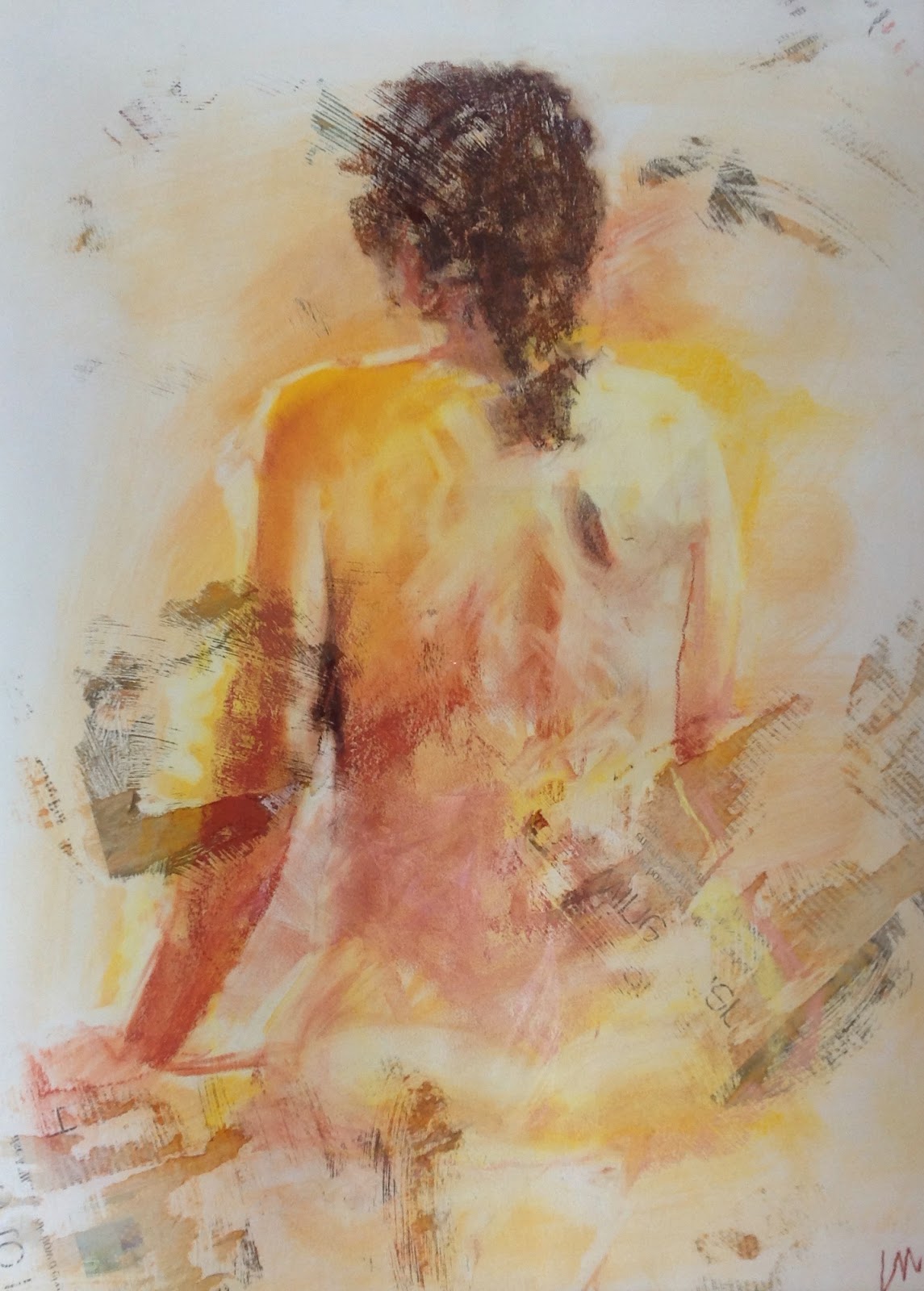 |
| Pastel on prepared paper |
I like to use newspaper ink and text using a reverse print method. I place the newspaper in wet paint and then remove it after a short time period. I find my best results are when only a small part of the ink is in the paint. Sometimes there can be more newspaper left behind. Another important point is not to leave any lines or edges - I tend to rip the paper edges first. Also I tend to put the paper on a diagonal or upside down so that the newspaper is not too obvious.
I have included some photos of the different steps with comments:-
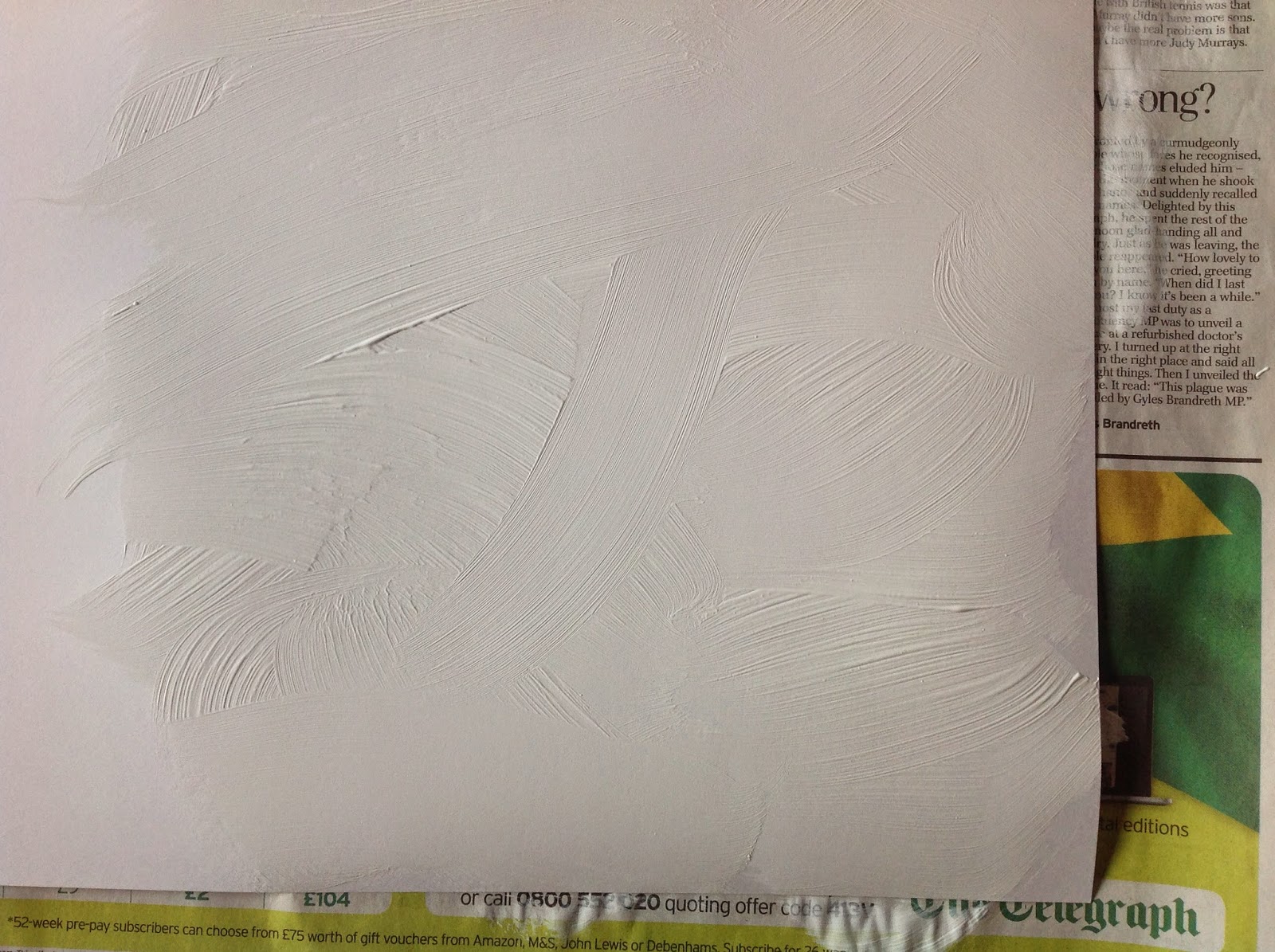 |
| Apply paint with a big brush. Put movement in. |
I like to play music while I work, it is quite therapeutic especially as there is no pressure on the result!
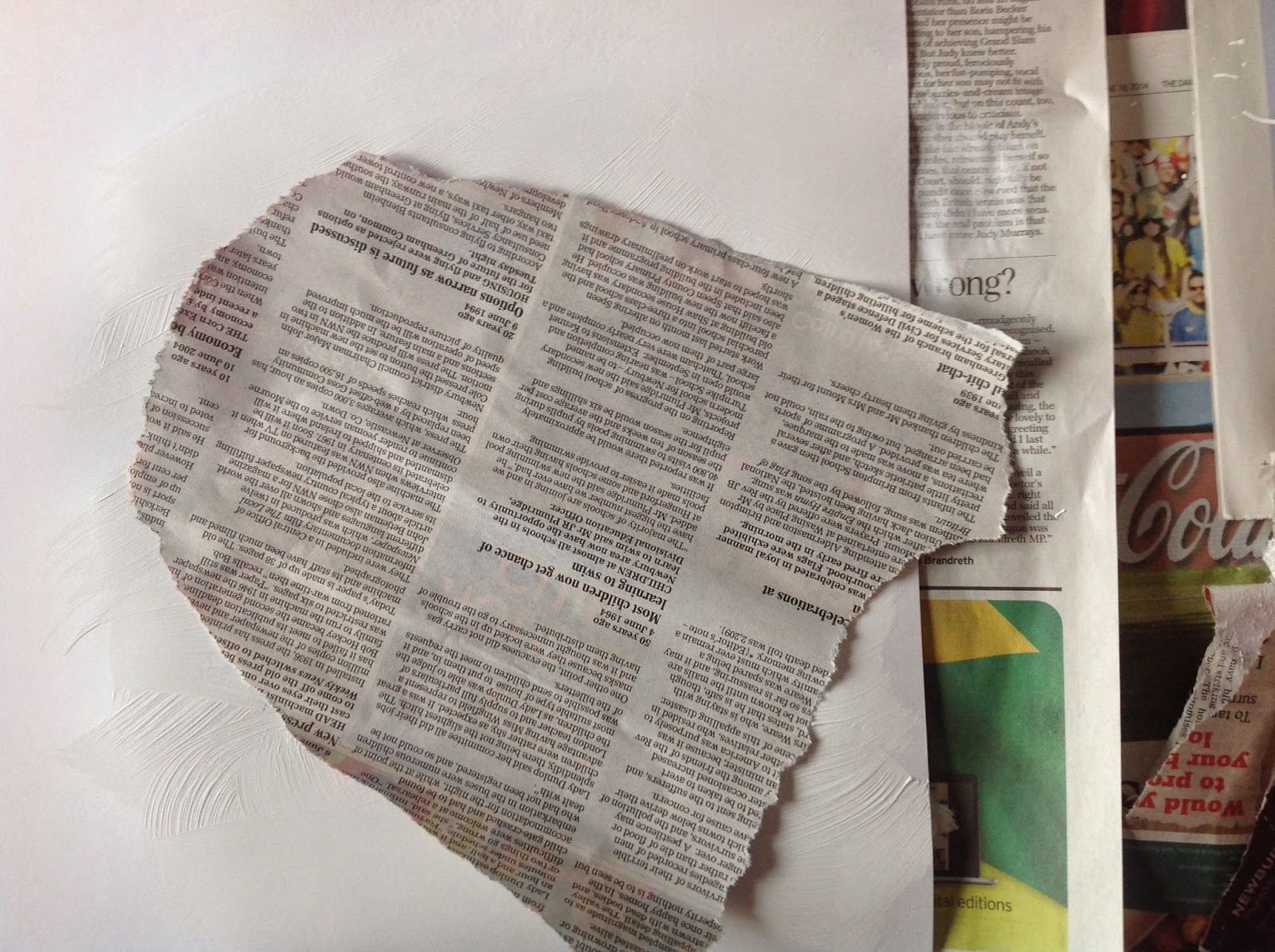 |
| Put a piece of ripped paper on the page. |
How long to leave the paper requires some experimentation. Typically 30 seconds to a minute but could be longer depending on paint consistency.
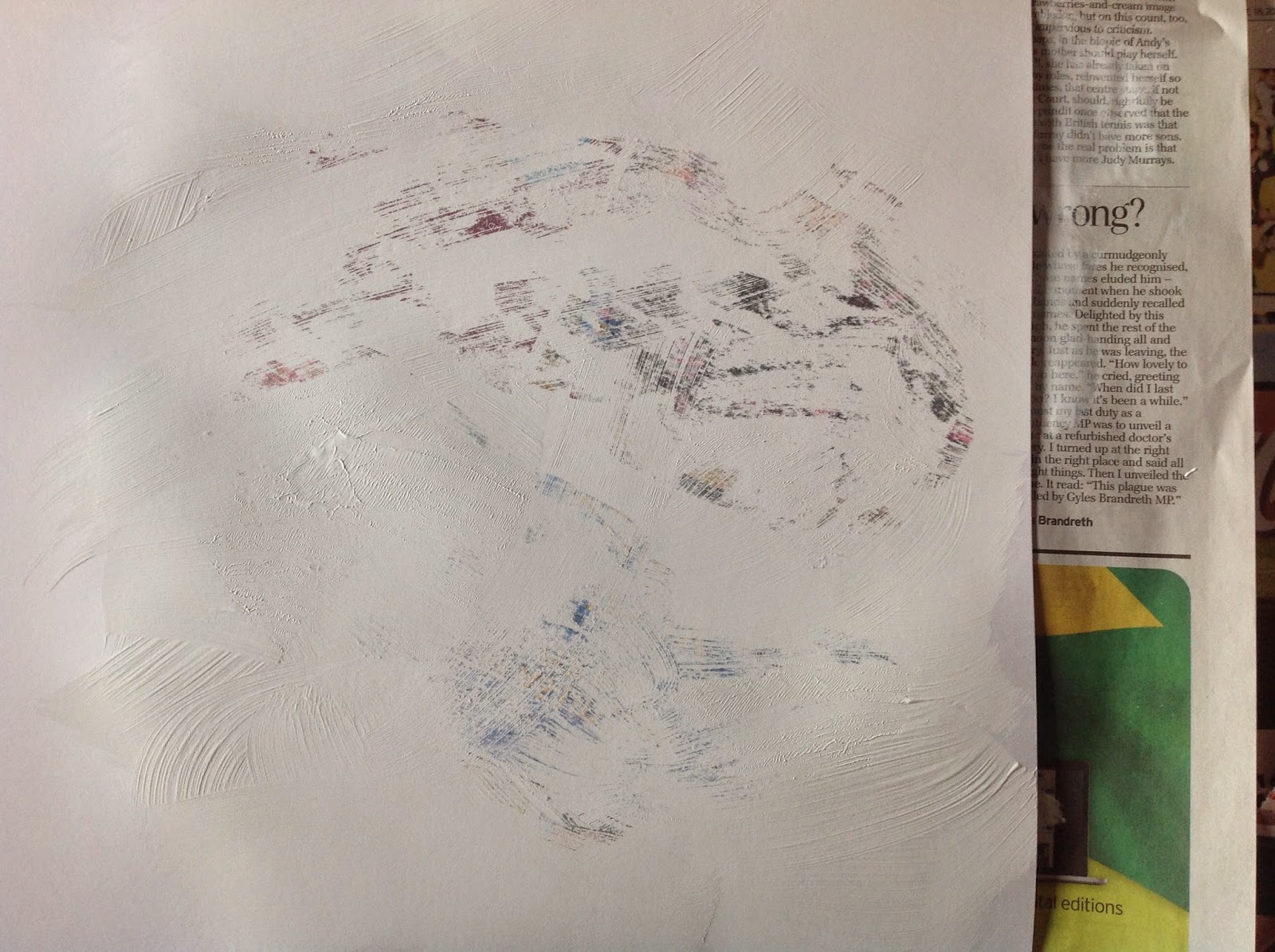 |
| Pull off the paper before too much has stuck on. |
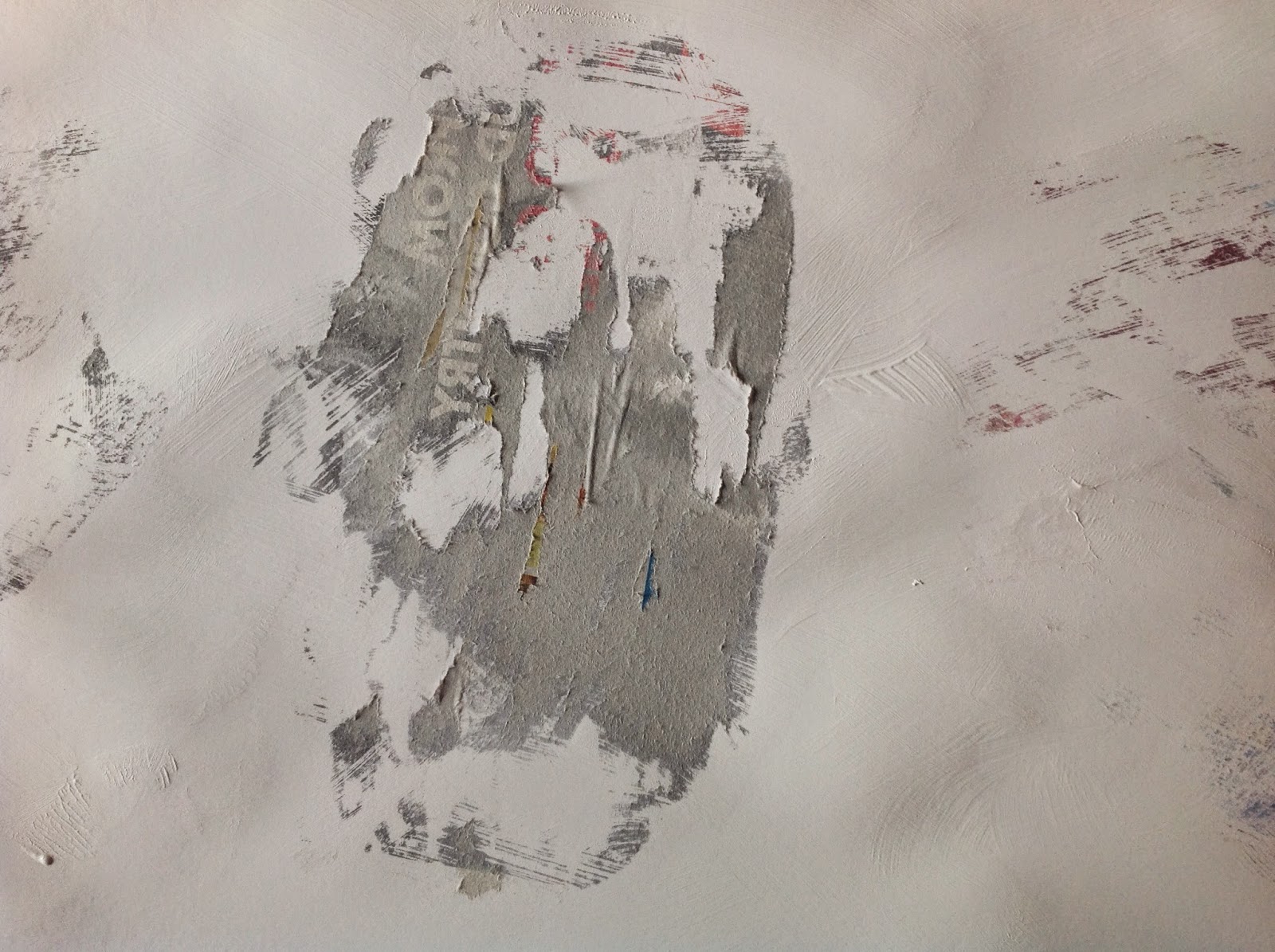 |
| Here there is a bit too much paper left |
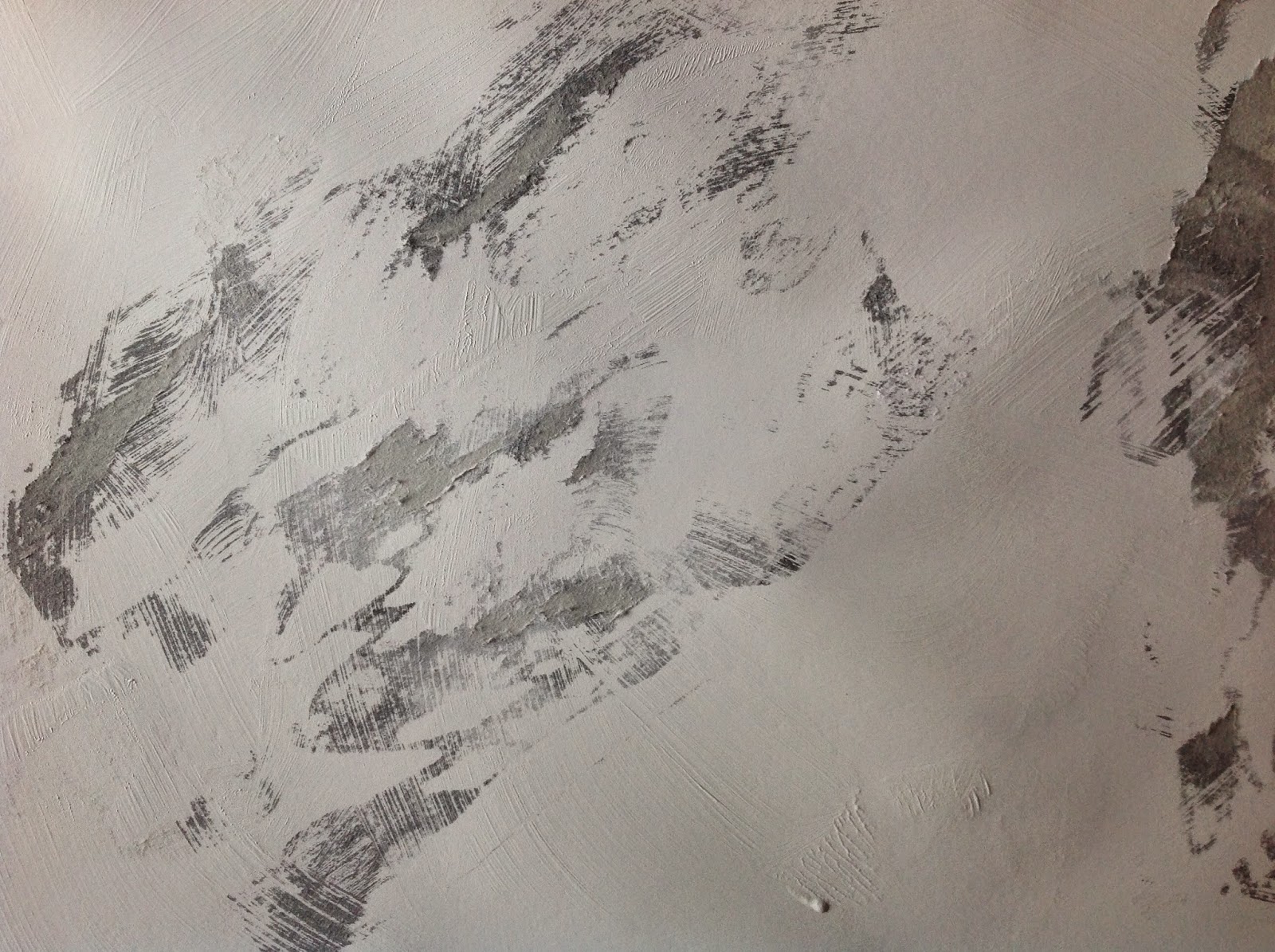 | |||||
| Another example, you can see the ink in the brush marks. |
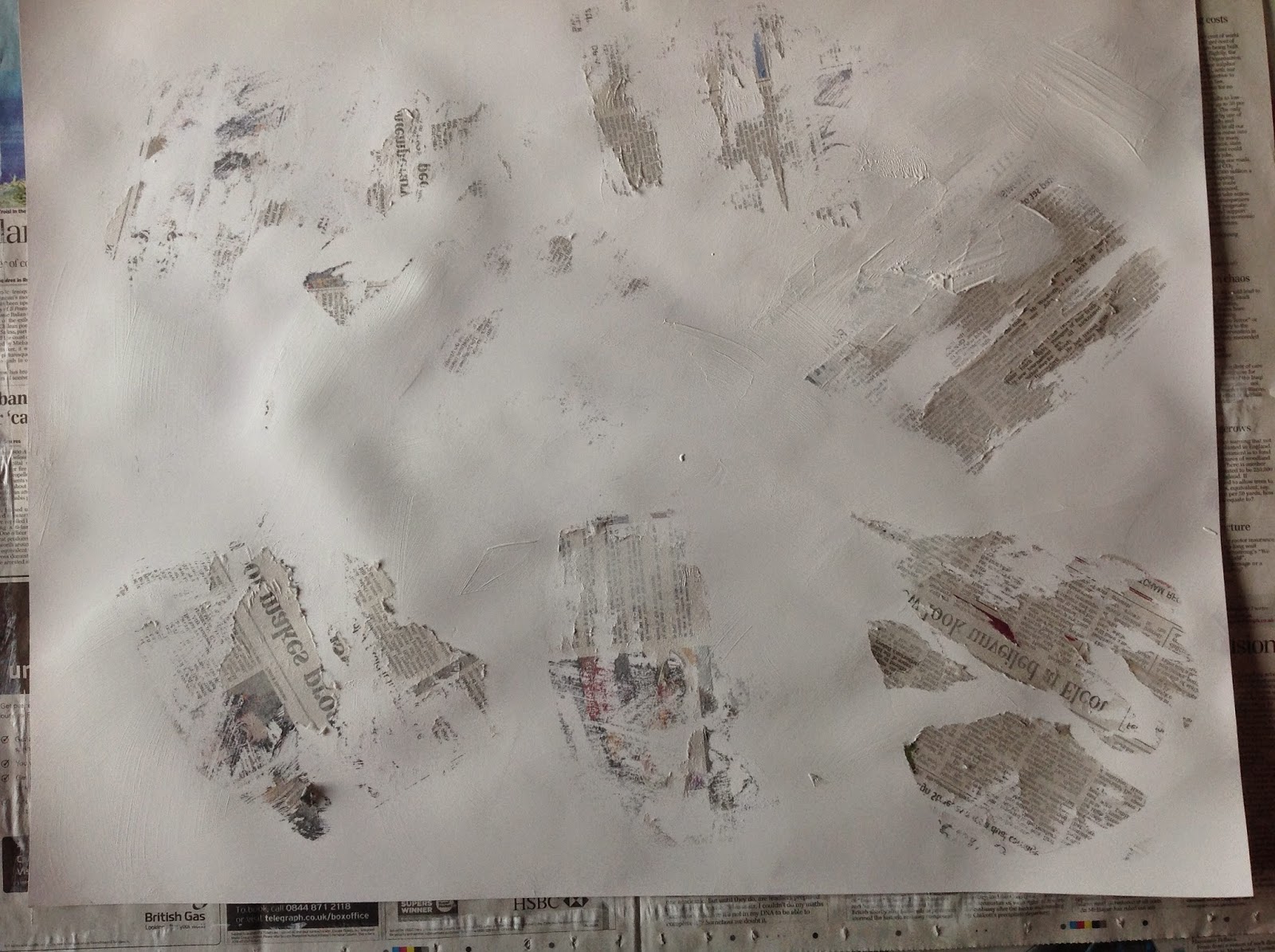 |
| A piece of paper ready for work. |
You may find you need to flatten the paper afterwards. I use 200g drawing paper, the thicker the better.
Have a go and experiment. If you need further information drop me an email.
Here's the pastel drawing I finished off at life drawing class.
 |
| Golden backed nude |
To keep it simple, you can just do the painting (stage 1) without newspaper as it can provide a wonderful feel for a charcoal life drawing on top. See example below.
Subscribe to:
Posts (Atom)











